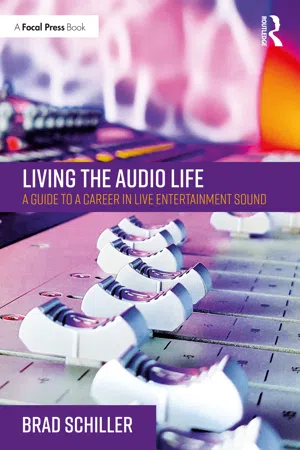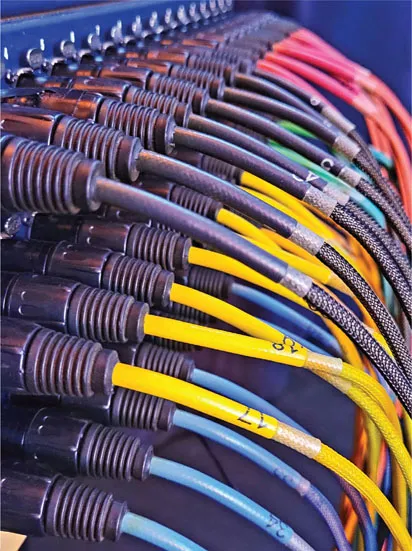The live entertainment audio industry consists of a plethora of vital positions that each come with its own set of unique qualities and abilities. You can make a career within just one of these roles or you can progress through many. Regardless of your path, it is important to understand the jobs that are available within the industry.
Production Audio Positions
Shop Technician
The shop technician generally performs his or her tasks within the confines of an audio or production shop. Specific duties range from warehouse attendance to show prep and equipment maintenance. In many cases, people begin their careers working in an audio or production company where they can hone their skills, gain equipment knowledge, and understand systems before participating in a crew for a show.
Show prep duties allow shop staff to work alongside production professionals as they prepare cable runs, test microphones and speakers, and sometimes even set up consoles and racks. This provides a great environment to gain valuable experience and learn from others. Furthermore, common show practices such as cabling, safety rigging, labeling, and other procedures are standard processes during shop prep.
Others will choose to specialize in equipment repair and work within an audio shop to maintain the equipment and ensure it is ready for each production. Shop technicians are an integral part of the industry as their preparation, repair, and quality control abilities have a great effect on the outcome of a production’s audio.
A2/A3/Audio Technician/Stagehand
The audio technician is a very broad job category that can apply to many different aspects of production and types of personnel. In general, an audio technician is a physical labor intensive position. You might be expected to load and unload trucks, set up sound rigs, run cables, wrangle microphones, organize wireless frequencies, troubleshoot situations, and much more. An audio technician is a jack-of-all-trades who should have skills that can be expanded into further career growth. Most people start their careers as an audio technician and then move on to more specialized positions.
Audio technicians are found working with all genres of sound and are essential to making a show happen. Some technicians may work as general stagehands, working with audio, lighting, video, sets, and more. Others will segment themselves to work only in audio. In either case, a good knowledge of how audio equipment operates and how a system is put together is essential. Some audio technicians are also skilled at repairing products, but this is not a requirement for most.
An audio technician must be prepared for physical labor, and in some cases, for climbing and working at heights. Understanding and following safety procedures is a must! Technicians generally are required to provide many of their own tools and follow the guidance of the crew chief, system engineer, or A1.
The audio field further classifies audio technicians into two different terms: A2 or A3 (or simply “sound number two” and “sound number three”). An A3 is a general technician that might often run mics, cables, and assist with changeovers, among others. They may also be assigned to assist with RF, systems, consoles, and more.
An A2 on the other hand is more of a primary and specialized position, and their duties are differentiated between production genres. In touring, the A2 will be responsible for many technical procedures and rig setup, while in theater the A2 is usually the person in the deck position working backstage. In television, an A2 acts as the FOH mixer’s eyes, ears, and hands for almost everything happening on stage. For corporate events, the A2 will work with the microphones, RF, and is often the sound system tech or second mixer.
More Technical Positions
Audio technician roles often take on different titles or descriptions depending upon the type of production or location in the world. Table 1.1 lists many of these positions.
Table 1.1 Audio Technician Positions | A1 | An expert engineer, often a designer and/or mixer. |
| A2 | A technical audio specialist. |
| A3 | A general audio technician. |
| Crew Chief | Someone responsible for the entire sound department goals and staff. |
| RF Tech | A specialist of wireless system installation and operation. |
| Stage Tech | A technician responsible for on-stage audio needs. |
| PA Tech | A person responsible for installing and maintaining the PA system. |
| Delay Systems Tech | A specialist in setting up, operating, and maintaining an audio delay system. |
| Overnight Systems Tech | A general technician that is employed for overnight shifts and not the main production. |
| Mic Wrangler | Someone who manages microphones and maintains headset systems. |
| Desk/Patch Engineer | Someone responsible for configuring the console and components. |
| Audio Programmer | A specialist that can operate various hardware and software systems and configure them for the specific production needs. |
| Sound Supervisor | A specialized position-holder responsible for ensuring sound is processed correctly for televised productions. |
A1 / Mixer
Often considered the pinnacle position in the industry, the FOH mixer is responsible for operating the primary console and mixing the live sound for the audience. Equally important is the monitor mixer that will support the talent directly in hearing one another as well as in any playback. Both types of mix engineers will meet with the band or talent before a show to discuss the sound goals. Then during sound check, the mix will be adjusted according to these parameters.
During the performance, the mix engineers will continue to make adjustments to the audio on the fly to ensure that both the performers and the audience hear a proper mix. Mix engineers need to have a great understanding of the quality of audio, volume, balance, and EQ, and must know how to listen for sound nuances during a show.
In many production environments the FOH mixer or A1 may be responsible for the entire audio system design and construction. They must understand not only how to mix a show, but also how the audio rig is put together, how it is transported, the budget allowed, the associated costs, and much more. They may also be the lead for the audio department, meeting with artists, producers, and crew members often to discuss the sound of each performance.
System Engineer
The audio system engineer is responsible for creating a safe and effective sound system while ensuring that the mixing engineers have what they need to be successful. Part crew chief, the system engineer will design the power and rigging configurations for the sound equipment and oversee the load-in and load-out.
Once everything is set up, the system engineer will continue to tune the system to create good sound within the acoustics of the particular room. An understanding of configuration software, frequency responses, and general pressure waves is essential for any system engineer. In cases where delay speakers are utilized, the systems engineer will also calculate and configure the proper delay settings.
Sound Designer
Sound designers are most commonly found in theatrical, television, and corporate productions and are responsible for everything the audience hears. The sound designer will create sound effects, atmospheres, and sonic textures to help facilitate natural and abstract environments, which aid the show’s story. They may also provide sounds related to props or other offstage effects. Usually the sound designer will select, edit, and mix audio recordings to best fit the needs of the production. In some cases they will work with a composer to create original music. They will also decide when an effect or a musical piece is played, how long it is played for, and where the sound will emanate from.
The sound designer also must understand how the audience will hear and perceive the sound and thus will make configuration changes to the acoustics of the venue or set and specify microphone types and placement locations. The ability to design the entire sound system and related equipment specifications is the essential skill of any sound designer. Most sound designers are proficient with various editing software platforms and own their own equipment as well.
Some sound designers take on multiple positions, such as mixer and/or system engineer. In some smaller markets, the sound designer may be a jack-ofall-trades and even be a crew chief and/or technician on the same production. The sound designer is also a liaison with the rest of the production team, artists, directors, band members, management, and more. Many designers will rely on a team of additional audio crew to help achieve the desired sound, while the designer is busy meeting with all the other stakeholders in the production.
Assistant/Associate Sound Designer
The role of an assistant or associate sound designer is to work alongside the sound designer and help as needed. Duties may include organizing cues, finding sound effects, creating and organizing paperwork, fetching coffee, attending meetings, choosing system components, and more. Depending upon the assistant/associate sound designer’s skillset and relationship with the designer, the tasks can run the gamut from the mundane to the highly creative.
Assistant/associate sound designers hold a coveted position as they often get to work alongside the sound designer, picking up valuable knowledge, resources, and contacts along the way. Typically an assistant is on the lower rung of these two positions, whereas the associate is a closer collaborator to the sound designer. The associate will contribute more to the sound of the production and have greater responsibilities than the assistant. However, depending upon the genre, the terms may be used interchangeably. Typically in theater the roles and labels are well defined, but not so much in touring, corporate, and house of worship environments.
Account Sales
An often-overlooked position within the entertainment audio industry is that of sales. There are two key types of salespeople within the field. First, there are sound or production company salespeople who work directly with productions to help them achieve their vision, utilizing the equipment on hand and within the specified budget. Quite often they are referred to as “account reps.” Then there are salespeople who work for manufacturers or distributors who negotiate deals with sound and production companies to ensure that they are purchasing the latest equipment on the market (see Audio Manufacturer Positions).
The rental or production company salesperson must have a good working knowledge of production, as this person will often make suggestions regarding gear, trucking, staging, crew, and more to assist the audio team before a production leaves the shop. Most account reps have a production background, having worked as technicians, crew chiefs, or mixers on many shows.
Most mixers or sound designers have their favorite salesperson at various sound shops and this relationship-based position is key to productions coming in on budget and on time. A good rental or production salesperson will also be the production’s point person regarding all the sound equipment and staff. Often the salesperson will be on site during pre-production to ensure everything moves...

